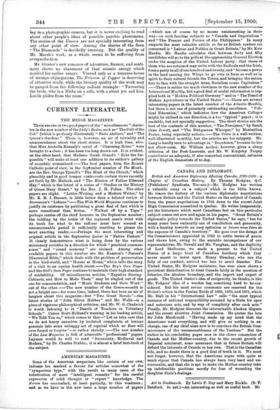AMERICAN MAGAZINES.
Some of the American magazines, like certain of our own, indicate too marked a favour for articles somewhat of the "symposium type," with the result in many cases of the substitution of mere "intelligent remarks" for the careful expression of solid thought or " expert " knowledge. The Forum has succumbed, at least partially, to this weakness ; and so we have in the new issue a large number of papers —which are of course by no means uninteresting in their way—on such familiar subjects as "Canada and Imperialism" and " The Present and Future of the Philippines." In many respects the most valuable article so far as British readers are concerned is " Labour and Politics in Great Britain," by Mr. Keir Hardie. Mr. Hardie calculates that between forty and fifty candidates will go to the polls at the approaching General Election under the auspices of the United Labour party ; that those of them who are returned may unite with the Radicals and the Irish, forma party in all of one hundred and twenty, and "become a power in the land causing the Whigs to go over in form as well as in spirit to their natural friends the Tories, and bringing the nation face to face with the straight issue, Socialism versus Capitalism." —There is rather too much viewiness in the new number of the International Monthly, but a good deal of useful information is sup- plied both in " Modern Political Germany " and in " The Trend of Modern Agriculture in the United States"—There are several interesting papers in the latest number of the Atlantic Monthly, but there is not one of genuinely outstanding excellence. "Poli- tical Education," which indicates how the American Colleges might be utilised in one direction, is a too "typical " paper ; it is readable, but not specially suggestive. The short stories are the best of the contents of this number, " The Foreigner," by Sarah Orne Jewett, and "The Dungarvan Whooper," by Maximilian Foster, being especially artistic.—The Critic is a well-written, well-illustrated monthly, but the articles are too snippety. Mr. Lang is hardly seen to advantage in "Decadence," because he has not elbow-room. Mr. William Archer, however, gives a sharp criticism of the Poet-Laureate, and Mr. W. Kingsley Tarpey contributes an adequate, if also somewhat conventional, estimate of the English dramatists of to-day.






































 Previous page
Previous page